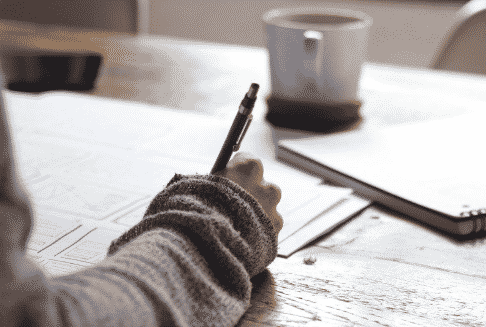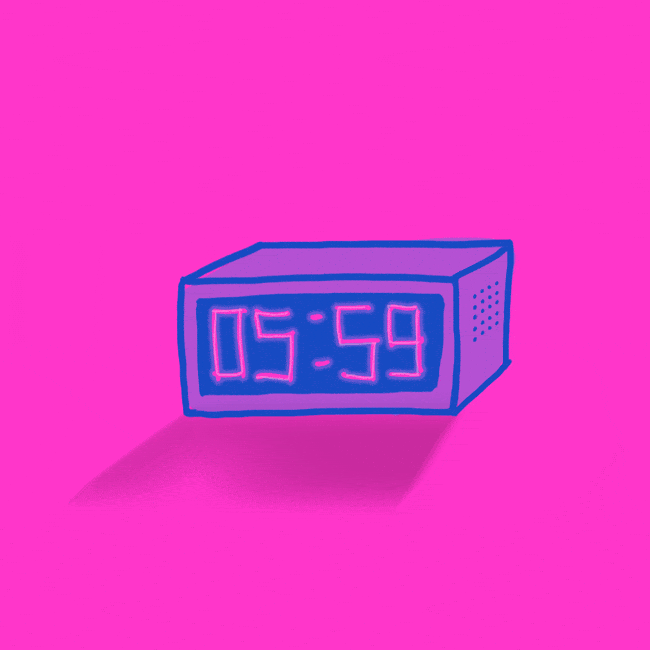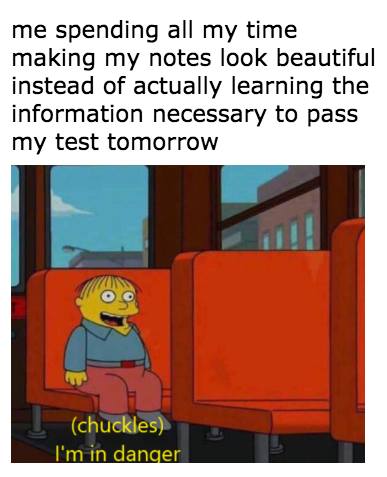You’re not weird if you often find yourself feeling particularly anxious before or during exams.
A survey that we conducted last year found that 66% of students classify exam stress and anxiety as the biggest challenge of externals. That’s a pretty huge problem; it’s also an understandable one.
Exams are nerve-wracking, period. It’s okay – in fact, normal – to feel daunted.
The good news is that grades are not indicative of worth. They don’t define you, and contrary to what your career counsellor says, they won’t stick around forever. Reputation, work ethic, and habits are more important.
Just like no athlete genuinely loves forcing themselves up early to train laps in the freezing cold at 5AM every day, no one loves entering exam halls for the thrill of it (except Becky, but it’s not all about you, Becky). But both parties do it for personal growth. The best athletes in the world still get anxious before they play, just like students. We’re all human.
But, for some of us, exams induce an impossible amount of anxiety: so much that it is almost suffocating.
There are two categories: low and high anxiety. Students with low anxiety may be nervous, but will still manage to focus on the exam without intrusive thoughts.
Students with high anxiety often have intense feelings of fear and inadequacy or debilitating thoughts, which can make even the act of attending the exam extremely difficult.
So whether you’re dreading unfamiliar texts the normal, healthy amount – or a bit more than that – these tips will definitely be worth your while.
1. Write your worries down

According to a University of Chicago study published in Science, students can combat test anxiety and improve performance by writing down their worries immediately before the exam begins.
Researchers asked students who were prone to exam anxiety to write down exactly what was causing them the most fear right before the exam. The impact of this one task was pretty striking. Students who did this improved their mark by one whole grade on average.
The science behind this is well established, and the research was approved by the National Science Foundation. When we write things down, it allows our working memory to let go of the information because we know we’ve got them down and they’re there. Having more figurative “room” in your brain is not only beneficial for stress-reduction, but it actually means we perform better.
The less space taken up by stressful thoughts in our working memory, the better.
2. Positive habits
Everyone’s response to stress is different, and so we all respond to the threat of exams in different ways. You might likely find that you’re forming habits that are making you feel worse. It’s common to slip into patterns like prioritising last-minute study over sleep, getting caught up in intrusive thoughts, or not talking to anyone for days.

One way to avoid this is to check in with yourself like you were talking to a friend. When you start to consider yourself in the third person, you begin to notice all of the not-so-nice ways you might be speaking to yourself, and all of the terrible advice you’re giving.

Once you become aware of toxic self-talk or behaviour, swap out your negative habits for one of the following:
- Positive reminiscence – recalling positive memories.
- Reframing – “this is an opportunity to achieve my goals, and I can do it.”
- Relaxation – mental and physical.
- Mindfulness – even check out an app like Calm or Headspace.
- Cognitive reappraisal – try and view stress as fuel, and a challenge you can overcome.
3. Get an exam routine
Routines are the magic ticket to feeling “on top of things”, and constructing a routine is a strong tool you have in your arsenal to help you feel more on top of your exams.

Ideally, practice your routine the night before an exam, and include the positive habits we just discussed.
Build a habit of implementing deliberate, purposeful strategies with the aim of building your sense of control. Often, anxiety stems from feeling like you’re not in control of a situation. Routines are like putting up the infrastructure to ensure that all of the things that are inside your control (eating good, proper study, sleep and cleanliness) are taken care of.
Here are some practical ideas to try out:
- Stop studying at a set time the night before to wind down and get 8-9 hours sleep.
- Wake up at an appropriate time on the day and have a chill morning (and eat!).
- Go over your checklist.
- Visualise the exam — what you’re going to feel, how’s it going to go down, what you might write.
- Listen to Hype Music.
- Watch something on YouTube you find motivating.
- Write down your worries.
- Meet up with friends to test each other’s cheat sheets.
- Eat something good before the exam.
- Prior Peeing Prevents Poor Performance.
4. The “If All Else Fails” Strategy
Exams usually say less about one’s effort, and more about their strategy. Often, we fall short because our study wasn’t geared towards recall, or we didn’t plan our study sessions to cover enough breadth, or we didn’t do enough practice exams. Whatever the case may be, there is nothing worse than the feeling of opening the exam booklet and feel a sudden sense of impending doom.

It happens to everyone – as we said before, even the best athletes in the world have bad games. Knowing that, it’s essential to plan for how you’d respond in the worst case scenario (I-Forgot-Everything-I-Know-Type-Situ).
Most of the time, the mind blank that comes upon opening the booklet is due to heightened levels of cortisol. This stress hormone is what effectively prevents you from thinking properly, making it really difficult to process the information in front of you. When your brain is on another level you don’t want it to be on, you can’t retrieve knowledge from your long-term memory.
When you find yourself here, try the following: stop looking at the paper and take deep, long breaths. Look at the ceiling and count the tiles (or insect poop). Give yourself reassurance that you’ve got this. Try and free recall (thinking of everything you know about the topic). Then, give it another shot.
5. Effective study
We’ve mentioned (a lot of times) that some study methods are more effective than others. Highlighting might feel good in the moment, but let’s be honest, it usually leaves you with a bit of a guilty feeling. This feeling comes from a good place: it’s your brain warning you that nothing’s actually going in.

Stick with strategies aimed at reinforcing the retrieval strength of the content (how well you’re able to recall it out of thin air), which will make a world of difference.

Here’s a few ways of optimising your study strategy.
- Test yourself regularly. This should form the foundation of your study system: practice papers, flashcards, turning your cheat sheet over, etc.
- Think about how content links together and applies to different contexts.
- Visualise the content – use your imagination!
- Summary sheets.
- Explaining maps (when you’re writing your notes, add an explanation of how and why it works – try and go as deep as possible, because that’s where you show a comprehensive understanding).
- Practice papers in exam conditions.
6. Prioritise Sleep

Before Jacob went to follow his dreams and star on Teen Wolf (keep an eye out), he was passionate about sleep. And he was right to be.
As previously mentioned, the body releases a stress hormone called cortisol. High levels of cortisol = more stress = more anxiety. The good news is cortisol reduces when we get between 7 and 9 hours of sleep.
Fun fact: most people have heart attacks upon waking up, because cortisol is highest when the light hits our eyes and we wake up sleep-deprived.
So, aim to get sufficient sleep the night before your exam. Contrary to popular belief, this doesn’t mean go to bed 8 hours in advance — think about it —it takes you a good amount of time lying there, especially if you’re worried about the MCAT in the morning.
An hour before sleep, turn your screens off and read over notes (or go for a walk, meditate, anything wholesome). Then, hit the hay 9 hours before you have to wake up.
7. Talk with friends and older students
It’s really important that we have a support network around us that’s built with people who make us feel better, not worse.

If you find yourself getting more stressed by Becky going on about how bad she’s gonna fail (when you know damn well she’s been studying for months), maybe don’t hang out with Becky right before the exam. Instead, talk with people who are motivated, and who view stress as a good thing — someone who pumps you up.
If you can find someone who will reassure you that you’re gonna smash it — whether it’s a mate, sibling, older student, or mum — that is ideal. Often, older students are a good bet. They can tell you what to expect, and how their life wasn’t ruined by a disappointing grade.
8. Conclusion
At the end of the day, it’s perfectly understandable that you’re anxious about exams. Thinking about why this is, and implementing strategies to combat it, are the best steps you can take to feel relaxed beforehand. We hope this helped.
One last tip: when you’re drinking your morning coffee, entering the exam hall, or looking at the booklet in front of you, visualise yourself leaving the exam on the other side having smashed it. After all, it’ll be over before you know it.

This is a challenge you can overcome and feel proud for doing it. Good luck.

0 Comments